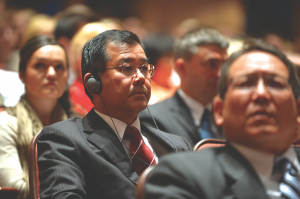
LDS Church leaders will deliver messages on a variety of gospel topics to more than 15 million people worldwide this weekend.
Portions of General Conference will simultaneously be translated into more than 90 languages — an undertaking that requires the help of dozens of translators.
BYU students, graduates and professors are on the forefront of this effort, which requires coordination and organization of those who speak both widespread and little-known languages.
In preparation for General Conference, translators break into teams by language. After all teams are accounted for, representatives from the church translation department come to BYU and seek out bilingual students who can fill the empty slots on teams.
For the larger languages like Spanish, native speakers are available; but in less common languages, a bilingual student can translate.
Hmong interpreter and BYU senior Christopher Young said each student must pass a proficiency test in his or her preferred language, they will then be invited to join a team.
“We go, and we practice and receive instruction on interpretation techniques and certain practice styles that we can do on our own,” Young said.
The translators work in a private room of the Conference Center, but they go to the Church Office Building for lunch between sessions, plus dinner for those who translate the Priesthood session. The food is a needed break in a long day. Raage Sofe, a BYU graduate, plans to leave Provo at 7 a.m. on Saturday and not return until 9 p.m.; then he will study talks to prepare for Sunday sessions.
“You pretty much live in Salt Lake for conference weekend,” Sofe said.
Sofe, like most other BYU student and faculty translators, is actually an interpreter.
“Most languages have translation offices in country who make a written translation, what will end up in the ‘Liahona,'” said BYU professor and Thai interpreter Mike Goodman. “Then people like me take that translation and make what are called text adjustments to transform it so it can be said in Thai at the same pace and feeling as it is being said in English by the general authorities.”
Sofe also receives the English version and the Arabic text, translated by a native speaker, beforehand so he can practice.
“Ideally you get the talks a few weeks in advance,” Sofe said. “But there’s been times when it’s day-of.”
Sofe is one of only two non-native speakers, and the only BYU student, on the eight-member Arabic team. He got involved with General Conference translation through a Facebook friend who told him the only requirements are to speak the language, live in Utah and hold a temple recommend. Sofe had just one training session before he started in April 2013, in which he learned about the translation equipment, general translation techniques and seeking the Spirit.
“The hardest part for me is keeping pace with the speaker,” Sofe said.
The translated version of any text is usually wordier than the original by nature, but General Conference translations still have to end when the talks do, Sofe said. The most difficult talks are those given by members of the Seventy, because they generally give content-rich, dense talks but only have 10 minutes, so they speak quickly.
Sofe’s first-ever translation was a particularly brisk talk by a member of the Seventy in April 2013.
“He was blowing past me,” Sofe said. A team member helped him keep time, and with some paraphrasing, he got back on track.
The Arabic team is mid-sized compared to other languages, so Sofe will translate one talk per session plus some of the prayers and conducting announcements, for which he receives no transcripts.
Translators learn how to accurately mark up the copies of talks they receive beforehand so they can pause for breath in the right places or emphasize important sections.
Goodman said one usually does not start with translating General Conference talks.
“When our team leaders certify that we are competent we then usually begin by translating for smaller events than General Conference,” Goodman said. “After we become more proficient and comfortable we’ll be assigned to serve during General Conference.”
Sofe will translate his third session of General Conference next week, something he relishes as an opportunity to both use his skills in Arabic and teach by the Spirit.
“I think it’s a really cool way to share the gospel,” he said.




